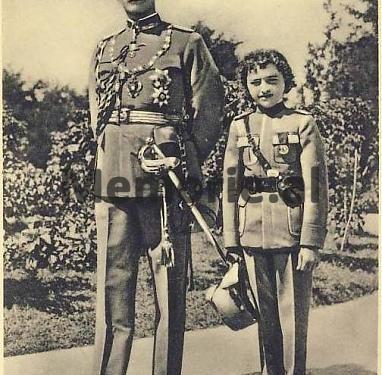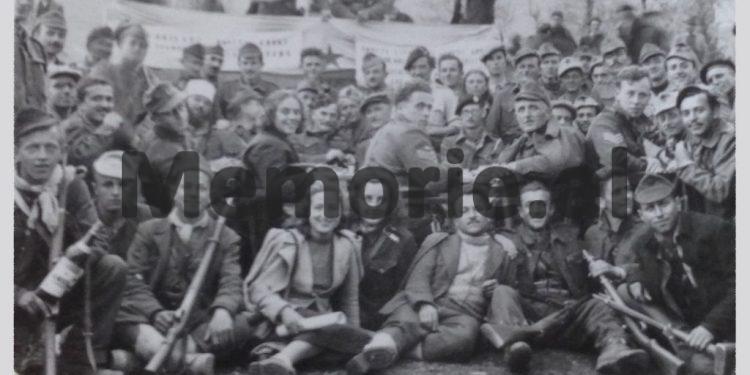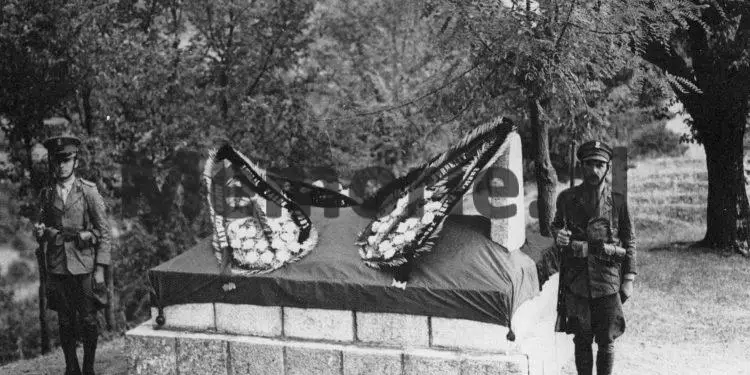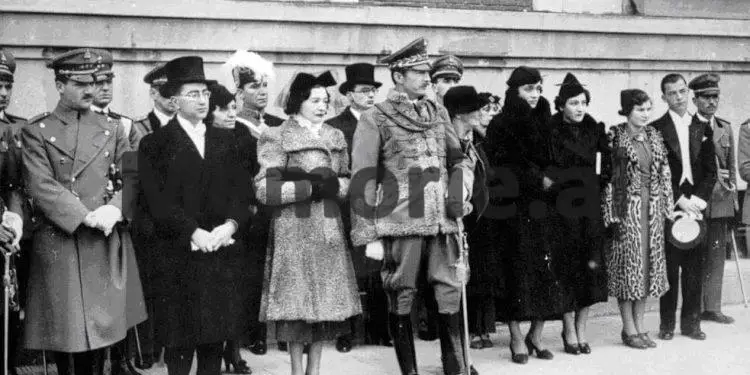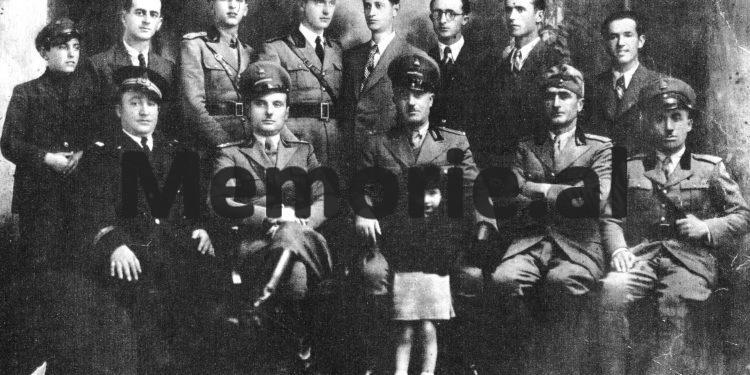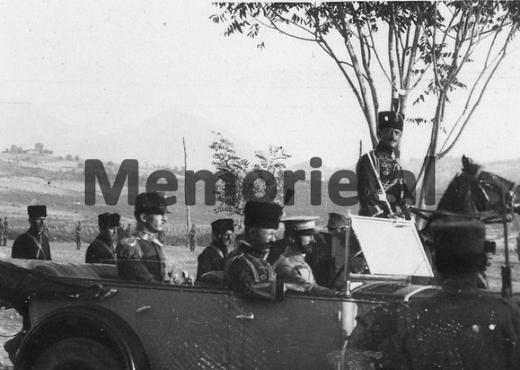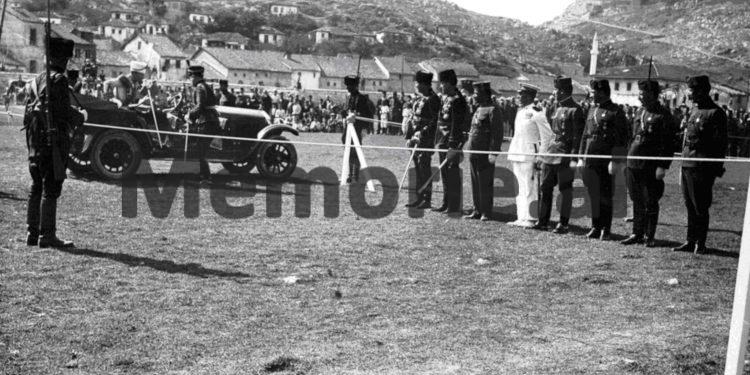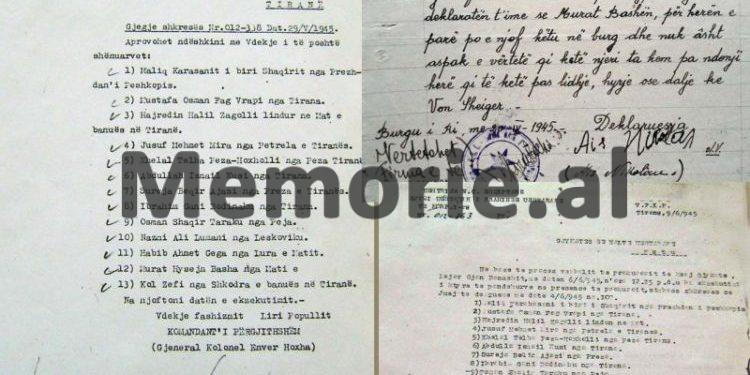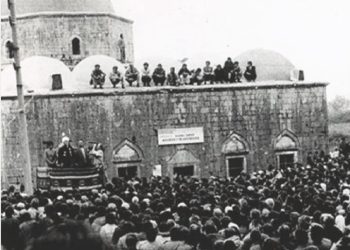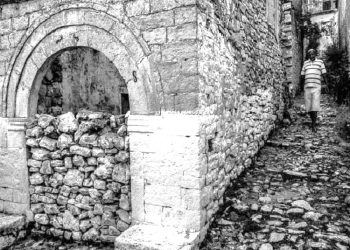Dashnor Kaloçi
Memorie.al publishes the unknown story of Major Murat Basha, originally from the village of Plan i Bardhë i Matit, suckling of one of the most prominent families of that province for patriotic traditions, otherwise known as one of the most loyal families of King Zog , as Murat’s grandfather, Veli Basha, had remained loyal to Xhelal Pasha Zogolli all his life, even when he followed him with full conviction in the wars against the Turks, after the establishment of the Albanian League of Prizren. Murat Basha joined the Albanian Gendarmerie in 1919 after a course he took with the intervention of Ahmet Zogu, to whom he remained loyal for 20 years throughout the Monarchy, initially as Commander of the Gendarmerie School in Tirana and then as an officer with the Royal Guard of Zog, until April ’39, when he left Albania with him and settled in Yugoslavia as a political asylum seeker. Major Basha’s return to Albania during the period of occupation of the country, where he cooperated closely with Major Abaz Kupin and was elected Chief of Staff of the Legality forces, fighting against German and partisan forces in Tirana, Kruja, Mat, etc. , until the end of ’44, when he was arrested by the Communists and sentenced to be shot and executed along with 12 others in late June 1945.
Who was Murat Basha?
Murat Hysen Basha was born in 1900 in the village of Plan i Bardhë in the district of Mat, in a family with patriotic traditions and well known in that province. Murat’s wife, Sadetja, was a great-granddaughter from the famous Frashërllinjëve family of Përmet, as her mother, Havaja, was from Abdyl Frashëri’s door. Likewise, Murat Basha’s family had an early friendly and spiritual connection with the Zogolli family from Burgajet i Matit, as Murat’s grandfather, Veli Basha, had remained loyal to Xhelal Pasha Zogolli all his life, even when he followed him with conviction. Full in the wars against the Turks, after the creation of the Albanian League of Prizren.
After the institutionalization of the League, by a unanimous decision of its leadership, Xhelal Pasha Zogolli was appointed Deputy Commander-in-Chief of the League Army and, at the head of this army, together with Iljaz Pasha Dibra (Cokun) and Ali Pasha Gucina, organized Albanian volunteers in defense of ethnic lands from the fragmentation of neighbors. In those tasks assigned to him by the League, Xhelal Pasha Zogolli had Veli Basha on his right wing, who was never assigned to him. After the death of Xhelal Pasha, the Basha family, Veliu and the young Hyseni (Murat’s father), were put in the service of Xhemal Pasha Zogolli, until the end of his life.
It was precisely this connection of generations, which conditioned the continuity of friendship between these families, which was followed in the close relationship between Ahmet Zogu and Murat Hysen Basha, since the first steps of the war and joint efforts for the benefit of the Albanian cause and consolidation of the new state. In 1904, Murat Basha’s family moved from Klosi and came to Tirana, where Murati initially attended the ‘Mejtepe’ school in the Madrasa of that time. After graduating from high school, Murati was appointed secretary of the municipality of Lukan in the district of Dibra, and a year later, in 1919, he was appointed mayor of that municipality. In the same year, Murati took part in the resistance of Dibra volunteers to protect the Albanian territorial integrity from the occasional attacks of Serbian chauvinists.
Meet Ahmet Zogu in 1919
According to the testimonies of relatives of the Basha family, during those years, Murati met Ahmet Zogu who had just returned from Vienna, and since then he remained one of his most loyal people. With the interest of Ahmet Zogu, in 1919, Murati completed a 6-month course in Tirana for gendarmerie non-commissioned officer, where he received the rank of lieutenant. After that he joined the Gendarmerie weapon and since then he has been constantly close to Ahmet Zogu, taking part in all the fighting carried out by the Albanian army against the Serbs and several various rebellions or uprisings that took place in Albania from the beginning of the years ’20s, and throughout the Monarchy period.
In one of these armed uprisings that took place in Tirana in 1922, Murati was wounded in the knee, and with the interest of Ahmet Zogu, he was sent to Austria for treatment. During his time in Austria for medical treatment, Murati completed another 6-month course in the Gendarmerie weapon. Although he was crippled by a wounded leg, Murati returned to Albania and continued to serve in the Gendarmerie until June 1924, when fanatical forces launched an armed uprising and toppled the government of Shefqet Vërlac. At the time, as one of Zog’s most loyal men, Murat accompanied him by staying close to him during his six months of political asylum in Yugoslavia. He also returned to Albania with Ahmet Zogu and his other loyalists on December 24, 1924, being one of the most active servicemen as a participant in that movement known in history as: “Triumph of Legality”.
After the establishment of Legality on December 24, 1924, the President of the Republic, Ahmet Zogu, entrusted Hysen Selmani with the difficult task of leading the reforms in the Albanian Armed Forces and the Albanian National Army, especially in the creation and modernization of the Special Department of the National Guard. In this very important and delicate task, Colonel Hysen Selmani had Major Murat Basha on his side, having him as the most loyal man. By personal order of the King, Zog, Lieutenant Murat Basha was appointed Commander of the Gendarmerie School in Tirana. From that time until April 1939, Murat Basha performed many tasks personally assigned by King Zog, such as those for the suppression of the Fier Uprising in 1935, or that of Delvina in 1938. For those special services and merits , (after the suppression of the Delvina Uprising), Zogu awarded Murat the rank of major.
April 7, 1939, fights in Vora and Preza
On April 7, 1939, Major Murat Basha took part in the symbolic resistance to the Italian invaders, leading several gendarmerie units in the Vora and Preza areas. After that, he was forced to leave Albania, in order not to fall into the hands of the Italian occupying forces, which had included him in the lists of Albanian soldiers who opposed the occupation of Albania with weapons. After leaving Yugoslavia, Murat isolated himself, along with many other anti-fascist patriots, in a camp set up by the Serbian government on the outskirts of Gostivar. He stayed in that camp until 1941 and at that time, (after the occupation of Yugoslavia by fascist Italy), together with Major Abaz Kupin, he returned to Albania.
Immediately after returning to his homeland, under the leadership of Abaz Kupi, Major Murat Basha put into service all his abilities to organize the Zogist resistance forces, participating and leading many battles against the Italians. He continued this until the capitulation of fascist Italy on September 9, 1943. During that time, Major Murat Basha was one of the founders and founders of the “Legality” Party which was formed in November 1943, in the village of Zall. Herr of Tirana. Being one of Abaz Kup’s closest and most loyal men, he tried and fought with him with the aim of giving the country a political and military force, which would represent the Zogist resistance movement during World War II. .
Basha, one of the main military of Legality
With the creation of the Legality Movement party, which in its program would have as an alternative the model of successful governance and the experience of 15 years of leadership of the Albanian state during the period 1924-1939, Murat Basha became one of the most military leaders its protruding. After the break-up of the Mukje Agreement in early September 1943 and the start of the civil war by the communists of Enver Hoxha, who began armed attacks on the Zogisto-ballistic forces, as one of the King’s most loyal soldiers and among the most trained at Abaz Kupi’s headquarters, Major Murat Basha played a crucial role in consolidating Legality’s military structures. This was especially evident during the winter of 1943-44, and the spring of 1944, until the beginning of the incursion of the communist partisan brigades towards the North in August 1944. During this period, Major Abaz Kupi entrusted Major Murat Basha with the leadership of the Legality military forces (at that time Major Murat Basha was appointed Chief of Staff of the Legality military forces that were concentrated in the village of Preza in Tirana), which would prevent the march of Enver partisan brigades Hoxha in the highlands of Tirana.
In this context, at the head of the Legality forces, Major Murat Basha fought for the protection of legalist and anti-communist families in the Shpali gorge, falling several times in efforts with partisan forces, which carried out an unprecedented terror on the civilian population of those villages or houses known as Zogists and Ballists. After the bloody fighting in Shpal in the highlands of Tirana, the Zogist forces led by Major Murat Basha, withdrew to the highlands of Kruja and Mat, organizing resistance against the communist-led partisan brigades, which, as had been witnessed in the South , reprisals and massacres against nationalist forces began. Such were those developed in the province of Martanesh (mainly in the village of Kurdari i Matit), in August 1944, in which, by order of Mehmet Shehu and Shefqet Peçi, 47 innocent civilians were massacred, in order to exercise terror and to easily subdue the North of Albania where most were supporters of Legality.
At that time, Major Abaz Kupi and Murat Basha led the fight against the partisan forces in Mat and the Kruja Mountains, forcing the communists to retreat several times. During the second half of 1943 and until November 1944, Major Abaz Kupi and Major Murat Basha, as well as other leaders of the Legalist forces, advised by the officers of the British missions attached to them, insisted on the cessation of hostilities, with in order to avoid bloodshed and civil war. And for this, they tried to avoid the efforts of the armed forces with the partisan forces, which had launched the offensive not against the German forces retreating on the national roads; Tirana-Shkodra and Tirana-Kukës, but to the nationalist forces of Legality, which were mainly concentrated in the villages of Tirana, Kruja and Mat, where they had their main support.
Arrest and shooting of Major Murat Basha
At the end of 1944, when the victory of Enver Hoxha’s communist partisan forces was a matter of days, Major Murat Basha refused to leave Albania like many other exponents of Balli and Legality. With full conviction that he had not committed any war crimes, especially against the people, Major Murat Basha willingly agreed to a fair trial, although he did not believe that it would be done by the victors of the War. After his arrest, Major Murat Basha was transferred to Tirana Prison, awaiting trial, along with many other nationalists.
One of Murat Basha’s contemporaries, the well-known veteran of the nationalist forces of “Balli Kombëtar”, Xhemal Alimehmeti, in his memoirs, described and spoke about Murat Basha, about the period when they were together in the political prison of Tirana. Although close to the nineties, with an admirable clarity and memory, Xhemal Alimehmeti also showed details of the last moments of Major Murat Basha, when he was before the shooting, along with 12 other anti-communists, at the end of June 1945. Veteran ballist, Alimehmeti, wrote in his memoirs that, after a trial with absurd charges and expedited procedure, 13 nationalists were shot: Major Murat Basha, Sure Ajazi, Xhelal Peza, Mersin Hasa, Hajredin Zogolli, Besim Pazari, Isuf Diva, Osman Taraku, Mustafa Vrapi Fagu, (20 years old). (The other four, he did not remember, as they were very young and almost unknown, but who were anti-communists).
Regarding this, among others, Xhemal Alimehmeti recalled: “On the day of the shooting, they tied them two by two, with pieces of barbed wire and, then, all together with a long wire. At the head of the boys, was Major Murat Basha, who encouraged everyone. At the end of the line, the brave young man, Mustafa Vrapi (Fagu), was tied up. We, the other prisoners, had heard the court decision to shoot them, and with a broken heart, they were waiting for the last moment to part with them. When they were taken out at the end of the long corridor of the prison, Major Murat Basha shouted loudly: ‘Long live the Ethnic Albanians … Long live the King …’, and then he began to sing the national anthem first. After him all the others began to sing and after them the whole prison began to sing loudly.
The guards were horrified. At the exit of the prison door, Fagut had his knees cut off and fell, but he was immediately inserted by the Kosovar patriot Osman Taraku, who lifted him with force and encouraged him not to give in to the executioners. As we later learned, the cause of Fagu’s weakness was his mother, who, having just learned that they had been sentenced to be shot, thought of harassing the executioners so that they would not kill her only son. Fagu, when he saw his mother fall at his feet, fainted for a moment, but overcame his weakness and walked resolutely with his friends. Twenty minutes later, we prisoners, with a frozen heart, heard the rifle batteries of the firing squad. After that, the platoon of police-killers came singing partisan songs, with Slavic lyrics and music, borrowed from Tito and Stalin and taught by Dusan Mugosha, Miladin Popovic and Soviet Major Ivanov.
The contrast between the Slavic songs and the patriotic songs of the flag anthem also made the difference between us and the communists. I knew a partisan who had once been with Balli, with the forces of Kadri Cakrani. This partisan was called Qemal, and I met him a few days later, where I asked him about the attitude of the brave before the shooting. He told me that: they died as heroes. Murat had refused to be blindfolded and before the executioners shot, he had shouted loudly: ‘Shoot the dog … Long live King Zog …’. Then they arrested 17-year-old Achilles, who was a high school student at the time. Together with Achilles, the communists arrested his friends, anti-communist high school students: Bujar Doko (famous translator), Abdulla Berberi, Ismail Lleshi, Petrit Toto, Petrit Berisha, Parid Derani, Perlat Myftari, Adem Petrela, Bardhyl Dindi, etc., a total of 12 13 people.
Then, Achilles went through the ordeal of prisons three times, while the family was mistreated, as Murati was afraid and often told me in prison, who did not ask about himself at all, but was worried about Achilles, who had weak points, so he prayed to God to save him. He was also worried about the whole family, which he adored “, Xhemal Alimehmeti closes his story, weeping, remembering his former prison friends who were executed by the communists as” enemies of the people ” . In the memory of Xhemal Alimehmeti, contemporaries and all nationalists, Major Murat Basha was and remains a great patriot, who fought for Albania and for the King.
The last letter to the wife, one day before the shooting!
A few hours before the execution, on the evening of June 6, 1945, while waiting for the firing squad to take him, Major Murat Basha was able to write a letter to his wife. In that piece of paper which Murat Basha’s family has preserved as one of its rarest things, it is said: “Ah woman, my black woman! For seven years now, your heart has been calming only with tears, tears and tears, that is, since April 7, 1939, and you, my blessed one, with all your toils, suffered, were imprisoned, interned, burned and burned. So it happened that you also fought your war. Why? To win freedom! Whereas today, when we waited to taste the right, the toil, the sweat and the bloodshed, on the contrary, after being able to become a victim of our torments, a victim. Ani, ani Sato loved him, do not despair again, but, please, as always live manly and stay, because I am becoming a victim of holy Freedom. Our world knows my case and appreciates it very well.
Order the following:
1 – Amanet kalamajtë, very, very, very careful about the fate and education of boys and with you gave some craft.
2 – Since the lead is yours, I believe they cannot get out of it, do as you please and God help you and I am confident that friends will not give up on you.
3 – I wish the grave did not confuse me.
4 – The clothes I had with me in prison, the list shows. Save it as the most precious memory on our part.
5 – Meet Metin, because he may bother you for help.
6 – Give these letters to the addressees.
7 – I do not regret that I am dying, that I am dying for Freedom and for our great cause. I am very sad for you and your family circle, because I know in what condition I am leaving you, and I could not describe my despair, God is empowering me with help.
So once again I am asking you and I am telling you to do a lot of shit …
I am finishing them, always kissing and hugging you.
In your heart
Murad
– Another message: Woe is me; do not make me, only gajret. /Memorie.al




